
Alan Jay Lerner was an American lyricist and librettist. In collaboration with Frederick Loewe, and later Burton Lane, he created some of the world's most popular and enduring works of musical theatre both for the stage and on film. Lerner won three Tony Awards and three Academy Awards, among other honors.

Carousel is the second musical by the team of Richard Rodgers (music) and Oscar Hammerstein II. The 1945 work was adapted from Ferenc Molnár's 1909 play Liliom, transplanting its Budapest setting to the Maine coastline. The story revolves around carousel barker Billy Bigelow, whose romance with millworker Julie Jordan comes at the price of both their jobs. He participates in a robbery to provide for Julie and their unborn child; after it goes tragically wrong, he is given a chance to make things right. A secondary plot line deals with millworker Carrie Pipperidge and her romance with ambitious fisherman Enoch Snow. The show includes the well-known songs "If I Loved You", "June Is Bustin' Out All Over" and "You'll Never Walk Alone". Richard Rodgers later wrote that Carousel was his favorite of all his musicals.
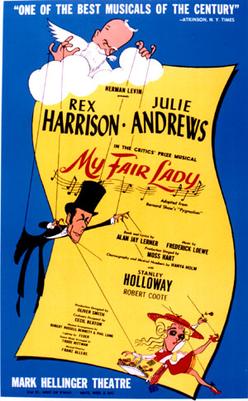
My Fair Lady is a musical with a book and lyrics by Alan Jay Lerner and music by Frederick Loewe. The story, based on the 1938 film adaptation of George Bernard Shaw's 1913 play Pygmalion, concerns Eliza Doolittle, a Cockney flower girl who takes speech lessons from professor Henry Higgins, a phonetician, so that she may pass as a lady. Despite his cynical nature and difficulty understanding women, Higgins grows attached to her.

The Sound of Music is a musical with music by Richard Rodgers, lyrics by Oscar Hammerstein II, and a book by Howard Lindsay and Russel Crouse. It is based on the 1949 memoir of Maria von Trapp, The Story of the Trapp Family Singers. Set in Austria on the eve of the Anschluss in 1938, the musical tells the story of Maria, who takes a job as governess to a large family while she decides whether to become a nun. She falls in love with the children, and eventually their widowed father, Captain von Trapp. He is ordered to accept a commission in the German navy, but he opposes the Nazis. He and Maria decide on a plan to flee Austria with the children. Many songs from the musical have become standards, including "Do-Re-Mi", "My Favorite Things", "Edelweiss", "Climb Ev'ry Mountain", and the title song "The Sound of Music".
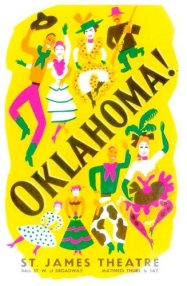
Oklahoma! is the first musical written by the duo of Rodgers and Hammerstein. The musical is based on Lynn Riggs' 1931 play, Green Grow the Lilacs. Set in farm country outside the town of Claremore, Indian Territory, in 1906, it tells the story of farm girl Laurey Williams and her courtship by two rival suitors, cowboy Curly McLain and the sinister and frightening farmhand Jud Fry. A secondary romance concerns cowboy Will Parker and his flirtatious fiancée, Ado Annie.
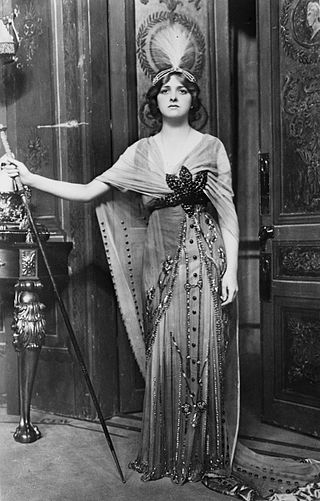
Dame Gladys Constance Cooper, was an English actress, theatrical manager and producer, whose career spanned seven decades on stage, in films and on television.
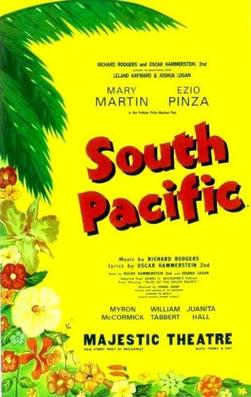
South Pacific is a musical composed by Richard Rodgers, with lyrics by Oscar Hammerstein II and book by Hammerstein and Joshua Logan. The work premiered in 1949 on Broadway and was an immediate hit, running for 1,925 performances. The plot is based on James A. Michener's Pulitzer Prize–winning 1947 book Tales of the South Pacific and combines elements of several of those stories. Rodgers and Hammerstein believed they could write a musical based on Michener's work that would be financially successful and, at the same time, send a strong progressive message on racism.
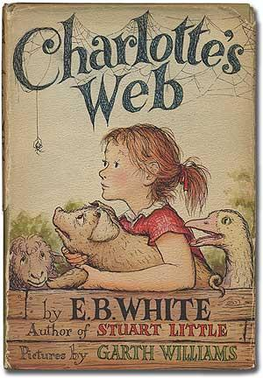
Charlotte's Web is a book of children's literature by American author E. B. White and illustrated by Garth Williams; it was published on October 15, 1952, by Harper & Brothers. The novel tells the story of a livestock pig named Wilbur and his friendship with a barn spider named Charlotte. When Wilbur is in danger of being slaughtered by the farmer, Charlotte writes messages in her web praising Wilbur, such as "Some Pig" and "Humble", to persuade the farmer to let him live.

Whistle Down the Wind is a musical with music composed by Andrew Lloyd Webber, who also co-wrote its book with Patricia Knop and Gale Edwards, and its lyrics were written by Jim Steinman. It is based on the 1961 film Whistle Down the Wind, whose source novel of the same name was written by Mary Hayley Bell in 1958.
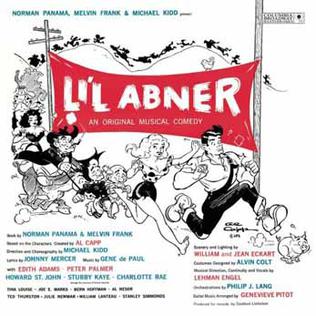
Li'l Abner is a 1956 musical with a book by Norman Panama and Melvin Frank, music by Gene De Paul, and lyrics by Johnny Mercer. Based on the comic strip Li'l Abner by Al Capp, the show is, on the surface, a broad spoof of hillbillies, but it is also a pointed satire on other topics, ranging from American politics and incompetence in the United States federal government to propriety and gender roles.

Charles Strouse is an American composer and lyricist best known for writing the music to such Broadway musicals as Bye Bye Birdie, Applause, and Annie.

Mack & Mabel is a musical with a book by Michael Stewart and music and lyrics by Jerry Herman. The plot involves the tumultuous romantic relationship between Hollywood director Mack Sennett and Mabel Normand, who became one of his biggest stars. In a series of flashbacks, Sennett relates the glory days of Keystone Studios from 1911, when he discovered Normand and cast her in dozens of his early "two-reelers", through his creation of Sennett's Bathing Beauties and the Keystone Cops to Mabel's death from tuberculosis in 1930.

Pamelyn Wanda Ferdin is an American animal rights activist and former actress. Ferdin's acting career was primarily during the 1960s and 1970s, though she appeared in projects sporadically in the 1980s and later years. She began her acting career in television commercials, made 250 television shows and films and gained renown for her work as a voice actress supplying the voice of Lucy Van Pelt in A Boy Named Charlie Brown (1969), as well as in two other Peanuts television specials.

Charlotte's Web is a 2006 American fantasy comedy-drama film based on the 1952 novel of the same name by E. B. White. Directed by Gary Winick and written by Susannah Grant and Karey Kirkpatrick, it is the second film adaptation of E. B. White's book, and live-action/CGI remake of Paramount's 1973 animated feature film of the same name produced by Hanna-Barbera Productions. The film stars Dakota Fanning, Kevin Anderson, and Beau Bridges, with voices provided by Dominic Scott Kay, Julia Roberts, Steve Buscemi, John Cleese, Oprah Winfrey, Thomas Haden Church, André Benjamin, Cedric the Entertainer, Kathy Bates, Reba McEntire, and Robert Redford. Danny Elfman composed the film's score.
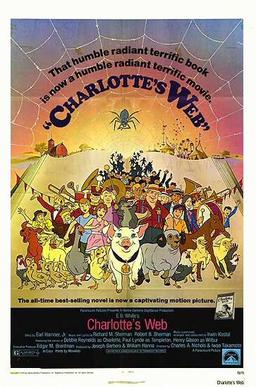
Charlotte's Web is a 1973 American animated musical drama film based on the 1952 children's book of the same name by E. B. White. The film was produced by Hanna-Barbera Productions and distributed by Paramount Pictures. Like the book, this film centers on a pig named Wilbur who befriends an intelligent spider named Charlotte who saves him from being slaughtered.

Kelli Christine O'Hara is an American actress and singer, most known for her work on the Broadway and opera stages.

Charlotte's Web 2: Wilbur's Great Adventure is a 2003 American animated direct-to-video musical adventure film. The sequel to the 1973 film Charlotte's Web, the film is a co-production between Universal Home Entertainment Productions and Paramount Pictures Corporation, with Nickelodeon Animation Studio handling production services, and Paramount Home Entertainment and Universal Pictures Video respectively handling North American and overseas distribution.
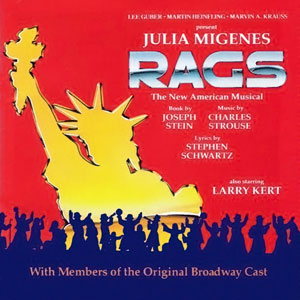
Rags is a musical with a book by Joseph Stein, lyrics by Stephen Schwartz, and music by Charles Strouse.
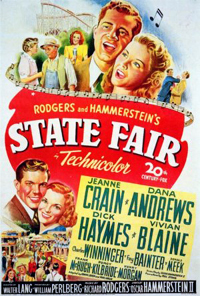
State Fair is a 1945 American Technicolor musical film directed by Walter Lang with original music by Rodgers and Hammerstein. It is a musical adaptation of the 1933 film of the same name starring Janet Gaynor and Will Rogers, itself an adaptation of the 1932 novel by Phil Stong. The 1945 film stars Jeanne Crain, Dana Andrews, Dick Haymes, Vivian Blaine, Fay Bainter, and Charles Winninger. State Fair was remade in 1962, that time starring Pat Boone and Ann-Margret.
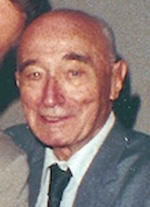
Hans Spialek was an Austrian-born American composer and orchestrator. Raised in Vienna and given an early musical education, he continued his studies in Moscow, at first as a prisoner of war during World War I, before settling in the US in 1924.



















